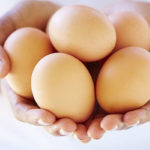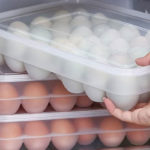Eggs are a highly nutritious food and good for your health. However, when shopping, it is difficult to determine whether the eggs are fresh or spoiled just by looking at them with the naked eye.
With some simple tips below, you will no longer have to worry about buying rotten eggs.
Simple tips to differentiate between old and fresh chicken eggs
– Observe the shell: This is an easy way because you only need to look at the outside shell, if you see a thin layer of white powder on the shell, it is a fresh egg, whereas old eggs are usually shinier, even cracked or damaged.
– Feel the shell: Hold the egg and if it feels heavy, and the shell is a bit rough when you touch it, it is a fresh egg. On the contrary, if the egg feels light in your hand, smooth, and even, it is an old egg.
– Gently shake the egg: This method is also very simple, you just need to hold the egg close to your ear, shake it gently, and if you hear a sound, it is an old egg. Eggs that move more vigorously are bad eggs. Fresh eggs will have a firm feel, so when shaken, you won’t hear much noise.

Simple tips to differentiate between old and fresh chicken eggs
– Smell the egg: Checking the smell of the egg is the simplest and most reliable way to know whether the egg is spoiled or not. Spoiled eggs have an unmistakable smell, regardless of whether they are raw or cooked. If you cannot determine when the egg is still in the shell, crack the egg into a clean dish and smell it. If it has a foul odor, dispose of it and wash the dish with hot water and soap before using it again.
– Examine the egg under sunlight or a lamp: Roll a sheet of paper or a rolled newspaper into a small tube. Place the egg on one end of the tube and hold it up towards the sunlight or the lamp. If you see that the air chamber (the hollow space) is small, the yolk is immobile, and the clear white does not have any veins, it is a fresh egg. On the other hand, if the egg has a large air chamber and the inside has many veins, it is an old egg.
– Float in water: This is a method that many people use. To perform this method, gently place the egg in a bowl or a glass of water. If the egg sinks, it means it is still fresh. If it tilts upwards or even floats, then it is old. If the egg is not fresh but not too old, it will float in the water. Or you can see the pointed end of the egg facing downwards, indicating that it is a good egg.
How to store eggs
When buying eggs, you should choose fresh ones to store for a longer time. After purchasing eggs, do not wash them with water, instead, use a soft wet cloth to clean them before storing. If you do not clean the eggs before storing, chicken or duck droppings on the outside shell can be unhygienic and even cause diseases.
Do not store eggs on the door of the refrigerator because the refrigerator door is frequently opened, so the temperature at the door is uneven and constantly changing, causing the eggs to spoil quickly. Therefore, the best way, after cleaning the eggs, is to wrap them in newspaper or place them in a carton box before storing them inside the refrigerator.
If you have already stored the eggs in the refrigerator, they should be kept inside the refrigerator and not taken out and placed in an external environment. At this time, the high external temperature will cause tiny water droplets to condense on the shell to penetrate into the egg, reducing the ability to resist bacteria, so the eggs will spoil faster.
If you do not have a refrigerator, you should store the eggs in cool places to prevent them from spoiling.
Storage time for eggs
Eggs stored in the refrigerator should only be kept for 3-5 weeks. Once the eggs are taken out of the refrigerator, they should be used within 2 hours, if left for too long, the eggs will spoil.
Only buy eggs stored in cool places; check to make sure the eggs are not cracked or dirty; ensure that the eggs are not expired; only buy eggs that have been inspected for quality.
Some notes when eating eggs
According to nutritionists, it is best to eat boiled or well-cooked eggs to maximize the absorption and digestion of nutrients such as protein, lipids, minerals, etc. Limit or avoid eating raw or undercooked eggs because they have low nutritional content and can contain harmful bacteria already present in the eggs such as salmonella bacteria.
Experts recommend that when preparing eggs, try to reduce the amount of egg yolk and consume more egg white for better health. After eating chicken eggs, it is best to eat vegetables and fruits rich in vitamin C to enhance the absorption of iron, protein, and calcium.
Source: vtc.vn





































